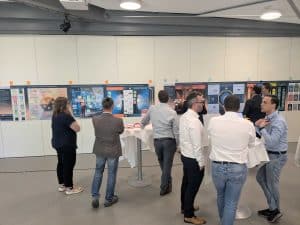
On May 13, 2025, the second workshop on the Digital Product Passport (DPP) took place at voestalpine in Leoben, as part of the ongoing 2CFIMH project. Organized in collaboration with Tietoevry, the session brought together nine companies from diverse sectors to discuss implementation approaches, regulatory uncertainties, and opportunities for innovation through the DPP.
The focus of this event shifted from conceptual design toward early actionable steps. While the final legal framework is still pending, participants emphasized the need to get started – especially in light of the anticipated 18-month transition period, which was widely viewed as ambitious.
From Uncertainty to Preparation
The DPP will impact how companies handle product-related data, compliance, and transparency – but many specifics remain unclear. Questions around scope, timing, and data requirements continue to dominate conversations. Rather than waiting for complete clarity, the workshop encouraged companies to prepare proactively by:
- Identifying internal stakeholders and roles that will be affected
- Mapping existing data and gaps
- Exploring potential use cases for the DPP beyond compliance
The dialogue highlighted that even limited preparatory work now can provide a significant advantage once regulations are finalized.
Interactive Format and Practical Dialogue
Like the first workshop, it emphasized on business model ideation through Business Value Design Thinking and on peer exchange and the translation of theory into concrete action. In facilitated group discussions, participants evaluated where their organizations stand and what steps they can already initiate – from data infrastructure assessments to pilot projects.
The need for sector-specific support and cross-industry coordination was also a key takeaway. Companies voiced concerns about resource investment, data sensitivity, and the risk of misaligned incentives between those who carry the costs of implementation and those who benefit.
Next Steps and Outlook
The atmosphere was marked by openness and commitment to shaping the DPP journey collaboratively. While legal uncertainties persist, the shared sentiment was clear: companies that wait risk falling behind. The workshop underscored that early action is not only possible, but necessary.
To continue this momentum, a third workshop is already in planning for July in Upper Austria.
Acknowledgments
We sincerely thank voestalpine for hosting the event, and extend our gratitude to Sean McGuire and Stefan Novoszel for their expert moderation. A special thanks goes to Tietoevry for the workshop content and their continued partnership. Most importantly, we thank all participating companies for their honest input, shared experiences, and forward-thinking contributions.
Through formats like this, the 2CFIMH project continues to support the development of the DPP as a key pillar for the future of sustainable and transparent industry.
